How does the Nexus device shortage affect you?
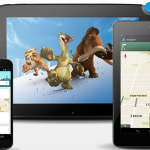
Yesterday I received Google Nexus 10, which Samsung manufactures. Like many of you, I stood in the virtual line to get the tablet and also the LG-made Nexus 4. Early after sales started November 13, I had both devices in my shopping cart. Google accepted my credit card and billing information. Only needed: to confirm the purchase, which I did giddily. Then Google rejected and cancelled the order. I never saw the smartphone for sale again. Today the status remains: "sold out". I feel lucky, but deeply dissatisfied, to get Nexus 10.
Blog and social network posts reveal that at least on these shores, many of you who successfully ordered received your devices yesterday. UPS tracking indicates my tablet arrived early, one-day shipping instead of two; that puts it in my grubby hands for the weekend instead of afterwards.
Is Windows 8 already a failure?
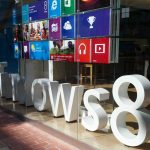
Late this morning, Robert Johnson sent me a link to Paul Thurrott story "Windows 8 Sales Well Below Projections, Plenty of Blame to Go Around" -- "Uncertainty could turn Windows 8 into the next Vista". The lead sentence is frightening: "Sales of Windows 8 PCs are well below Microsoft’s internal projections and have been described inside the company as disappointing". Uh-oh.
Robert asked my opinion, and I'll give it. Relax. Slow start isn't surprising at all. I've said for more than a year that Windows 8 wouldn't be big. It's a transitional operating system coming when most businesses just upgraded to Windows 7 or are in process of doing so and when tablets capture consumer interests more.
Google TV's killer app is simply amazing

This week, Google brought a little something from ill-fated Nexus Q to Google TV. Even my non-techie wife is amazed, and that's the point. This little something is really big, because anyone can use it and get dramatic benefits.
The new YouTube for Android app installed on smartphone or tablet now acts as a remote control to Google TV, taking interaction far removed and clumsy and making it intimate, fun and easy. If Amazon and Netflix operated similarly -- and the set-top box got Hulu Plus -- I'd cancel AT&T U-verse, baby.
Enterprise IT spending reaches $2.68 trillion in 2013

Economic worries will hold back enterprise IT spending next year, Gartner predicts. The analyst firm sees tepid 2.5 percent growth to $2.679 trillion, up from projected $2.603 trillion. "The global economic outlook has deteriorated in 2012, leading to scant overall growth in enterprise IT spending", Kenneth Brant, Gartner research director, says.
But there's a glimmer of sunlight in the economic gloom. "Our third-quarter outlook points to more substantial growth in 2013, if significant fiscal crises are avoided in the US and Europe, and in subsequent years. Most enterprises have already significantly cut discretionary IT spending growth over the past several years and, barring a global economic catastrophe and significant contraction of operations, they have little room to reduce IT spending further over the long run".
Kindle Fire HD arrives to cool competing choices
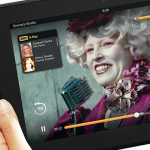
Perhaps, with all the buzz about Apple iPad mini, Google Nexus 10 and Microsoft Surface, you forgot about another important tablet launch. Amazon Kindle Fire HD WiFi is available, starting today, following two months or preorders. The LTE model comes next week. So many headline competing tablets launched since Amazon's September announcement, Kindle Fire HD could easily be overlooked. Completely forgotten? Buyers will answer that question.
Kindle Fire HD certainly looked like the iPad killer when unveiled. The 8.9-inch models nip iPad's 9.7-inches, offering much more, for much less. In-between Kindle Fire HD's announcement and availability, Apple punched out 7.9-inch iPad mini. Meanwhile Google stepped with newer Nexus 7 tablets (one with 3G) and larger Nexus 10. What distinguishes the lot are curated app and content stores. You're not just buying a tablet, or as Robert Johnson expressed in his Surface review yesterday, but an ecosystem, too. The point: No one should buy based on hardware features alone. Kindle HD and its competitors are about so much more.
You can thank Microsoft for iPhone's retreat before the Android Army
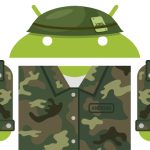
Two months ago, I declared Android winner in the smartphone wars. The victory is now broader, in a total route of all competing operating systems and in process driving down iOS market share. That's right, after more than five years of near-constant growth, Apple's platform retreats before the Android Army.
Android's global smartphone OS share rose a stunning 19.9 points year over year in third quarter, according to Gartner. That's to 72.4 percent, up from 52.5 percent. Meanwhile iOS fell to 13.9 percent from 15 percent.
Google blows Nexus devices launch
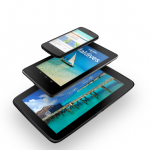
If anyone should be able to handle online orders, other than Amazon, Google should be it. This is a cloud company, after all. But today's Nexus 4 and Nexus 7 sales debuts are a total bust, with countless processing errors. Google pissed off the wrong people. Blog and social network reports from the other launch countries boded ill for sales starting at 9 am PT today in the United States. Matters are much worse.
Even before the designated launch time, the costlier $349 Nexus 4 went out of stock, with many failed and successful buyers reporting multiple errors during the sales process. The $299 model shifted to "Notify Me" from "In Stock" minutes later. By 9:15 am PT neither smartphone was available, with lots of eager geeks frustrated by their unsuccessful attempts to buy a product in the shopping cart and purchase part-way processed. These gadget geeks are loud mouths and will rake Google for the fiasco launch.
Microsoft shareholders react to Steven Sinofsky departure
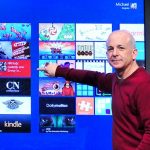
Microsoft's stock is off to a rocky start this morning, down 3.2 percent as I post, on news that Steven Sinofsky is out. Shares opened at $27.02, down from yesterday's $27.99 close. The stock immediately fell, to $26.75, in early trading.
Sinofsky's departure came suddenly late last night, in an announcement from the company. The high-profile divisional president is credited with salvaging Windows after the disastrous Vista release in early 2007. Successor Windows 7 launched in autumn 2009 and received reasonable reception. Team Sinofsky followed up with Windows 8, RT and Surface tablets less than three weeks ago. The suddenness of his departure, right at the start of such a big product launch, is uncharacteristic of Microsoft.
Google Play starts selling new Nexus 4, 7 and 10 devices

Today Google released Android 4.2 and new devices -- Nexus 4 and Nexus 10 -- running the software. The Nexuses (Should I say Nexi?) are available in Australia, Canada, France, Germany, Italy, Spain, United Kingdom and United States. Unconfirmed user reports on blogs and social networks claim sell-outs in Asia-Pacific and Europe. Sales in North America commence at 9 am PT, from Google Play, representatives confirm.
LG makes the 4.7-inch smartphone and Samsung the 10.1-inch tablet, which join the ASUS-manufactured Nexus 7. The cloud services company announced the new products on October 29.
Steven Sinofsky is OUT at Microsoft!
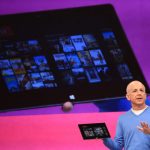
Microsoft has a longstanding tradition of promoting executives responsible for Windows soon after a new version releases. But in a stunning turnabout, Windows & Windows Live president Steven Sinofsky is finished, gone effective immediately, according to a late-evening announcement by Microsoft. To say I'm stunned is an understatement.
Sinofsky is the architect responsible for Windows 8 and RT, which launched on October 26. The backstory here must be something. Consider the timing, less than three weeks later. There's no transition. It's typical for Microsoft senior executives to go gracefully over X number of months following an announcement like this. Yet he's gone, as if fired or departed following a power play. I have no inside scoop at the moment, but will seek answers to the question many people will ask: "What now?" Sinofsky's departure forebodes during a crucial product launch.
Who will buy Google Nexus 4?
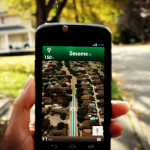
Tomorrow, Google Nexus 4 goes on sale, along with the new Nexus 10 tablet. The question: Who will buy? I've got answers.
Six days ago, I posted poll "Will you buy Nexus 4?" Early responses are quite surprising. Exactly 53 percent of respondents say they will buy the smartphone "as soon as available", with another 15.4 percent planning to do so "within 3 months of release". Say, what? Yes, that's my reaction, too. But the phone has received rave reviews from those publications receiving one (we're on the wait list). The results contrast strikingly with our iPhone 5 buying poll. More than 70 percent plan to buy Nexus 4 vs 33 percent the Apple mobile.
I was wrong about Google Nexus tablet

In December 2011, I asserted: "Google Nexus tablet in six months is a year too late". The search and information giant proved me wrong. After failing to quickly respond to iPad and leaving Android leaderless, Google has recovered with a bang-up Nexus device strategy. Damn, this is my second tablet mea culpa -- the first about iPad nearly 18 months ago.
Tomorrow, Google expands the number of available Nexus screens to three, all running Android 4.2 Jelly Bean: 4.7-inch smartphone that replaces Galaxy Nexus as flagship; 7-inch tablet updated with more storage for purchase price and new 3G model added; 10.1-inch slate with higher screen resolution than iPad 4. The devices are "pure Google" and produced by LG, ASUS and Samsung, respectively. The original Nexus 7 released in July, receiving rave reviews and generating, ASUS asserts, about 1 million sales per month.
If you thought $249 was too much to pay for Chromebook, how's $199?
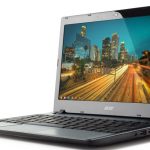
Just when everyone (including me) thought Google and Samsung offered the killer price on Chromebook, along comes Acer. Starting tomorrow, from Google Play and major retailers, Acer's newest Chromebook goes on sale for a cool $199. That's right, 50 bucks less than Samsung's no-brainer "I got to buy it" bargain-basement model. Why not just give it away? In the esteemed words of Crazy Eddie: These "prices are insane!"
But low cost brings hidden costs, and the Acer C7 Chromebook is full of compromise for $50 dollars savings. For starters, it's a heftier beast, both in size and weight, coming in about a half pound heavier (1.4 kilograms). The newest Samsung comes with super-fast ARM Cortex A15 processor, while the Acer is Intel Celeron. In a big departure from all previous Chromebooks, the C7 swaps SSD for a standard hard drive. That means more capacity (320GB), but more moving parts and presumably greater performance overhead. I got to ask: Who needs all that storage on a device primarily running Web apps? The clincher: 3.5 hours battery life, compared to the ARM model's 6.5 hours.
Microsoft Surface makes a good first impression
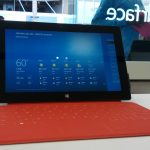
This afternoon I got my first look at Microsoft's Windows RT tablet at the company store here in San Diego. I wanted to drop by for two weeks, but simply couldn't make time. Today, my daughter needed a ride to Fashion Valley Mall; she's got a new job there. That gave me 90 minutes free time for Microsoft Store -- oh, and four doors down Apple, too.
I am pleasantly surprised by my initial reaction, which quite simply is "wow". This starkly contrasts with my negative response to iPad mini. (But the Apple Store jaunt to see the tablet can wait a few paragraphs.) Surface's display is bright, clean, clear and crisp. Font rendering is superb, particularly given resolution is only 1366 by 768. The tablet is fast and touch-response exact and fluid. Presentation of default apps, such as MSN and weather, pop. They look exceptionally good, and Microsoft serves up lots of rich touchy, feely additional content throughout. Presentation gets A-plus.
Apple and HTC settle patent dispute

Tonight, Apple and HTC ended their longstanding patent litigation. The agreement terminates all litigation and establishes cross-licensing of patents current and future for 10 years. The deal raises questions about whether Apple might step back from its aggressive litigation, working with competitors. Cross-licensing intellectual property tends to be mutually beneficial, and it's a tactic long pursued by Microsoft.
"We are glad to have reached a settlement with HTC", Apple CEO Tim Cook, says. "We will continue to stay laser focused on product innovation". HTC CEO Peter Chou remarks: "HTC is pleased to have resolved its dispute with Apple, so HTC can focus on innovation instead of litigation".
Joe's Bio
Joe Wilcox is BetaNews executive editor. His motto: Change the rules. Joe is a former CNET News staff writer, JupiterResearch senior analyst, and Ziff Davis Enterprise Microsoft Watch editor.
Ethics Statement© 1998-2025 BetaNews, Inc. All Rights Reserved. Privacy Policy - Cookie Policy.
